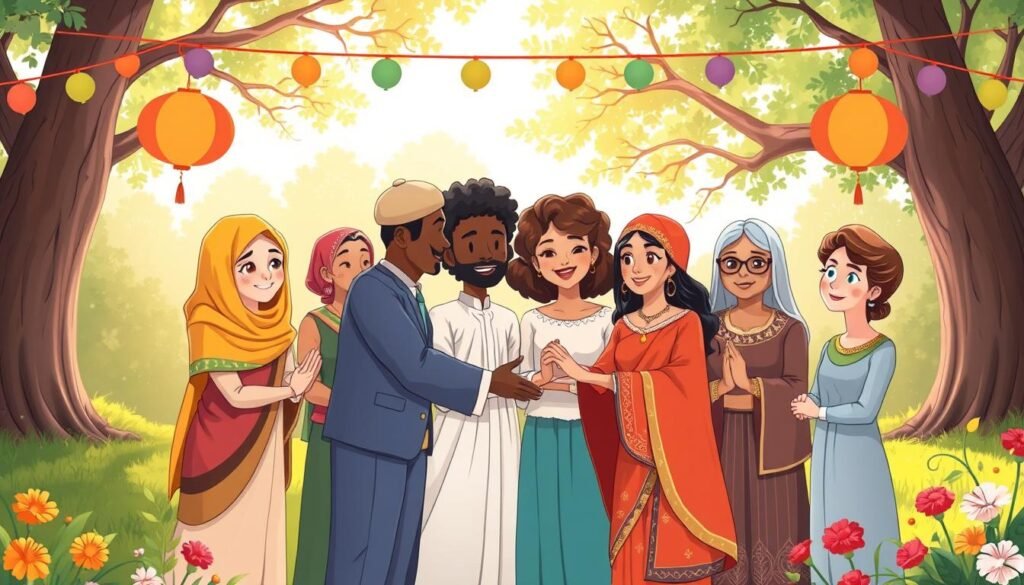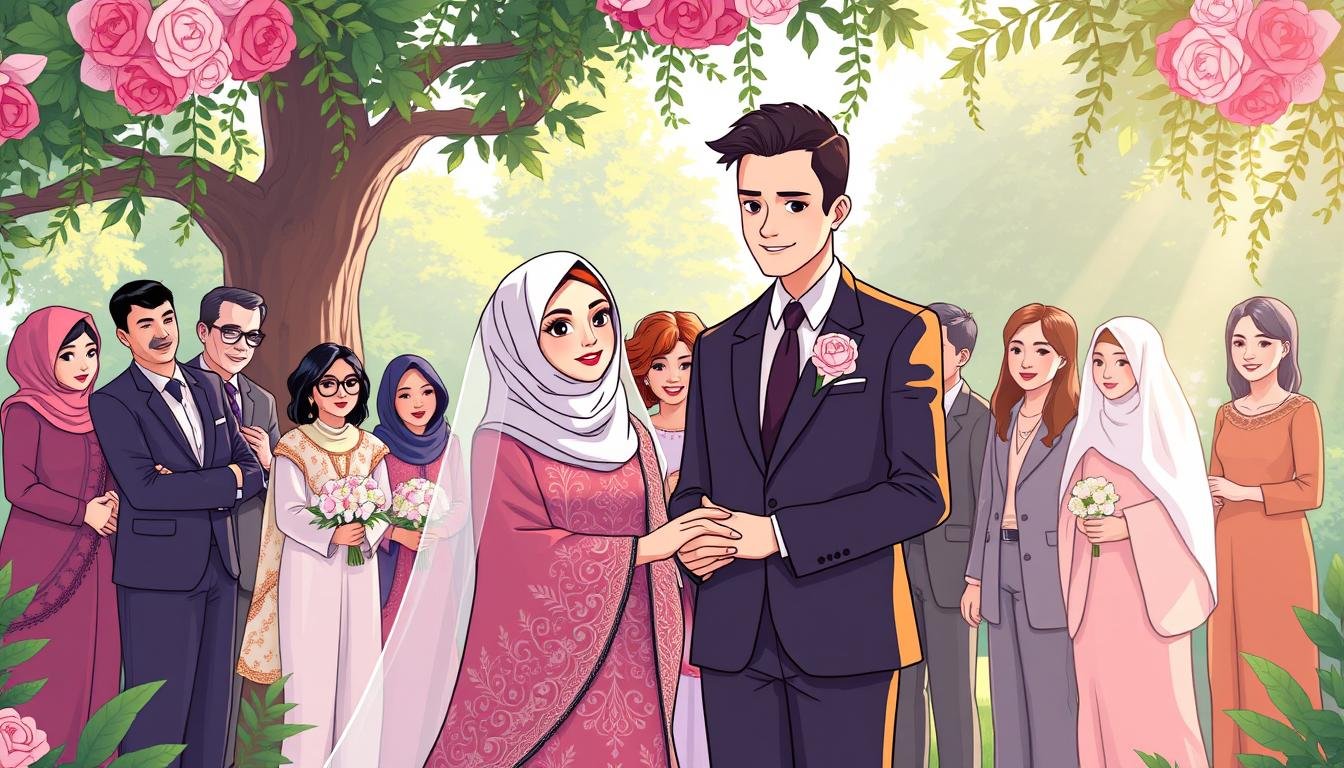As we live in a world that’s more connected than ever, a big question comes up. Is it okay for Muslims to marry people who don’t follow Islam? This question is not just about personal choice. It’s about understanding Islam’s rules on marriage and the challenges of Muslim and non-Muslim relationships.
About 10% of Muslim women in the U.S. are married to non-Muslims. This number is even higher among the young. The effects of interfaith marriage are huge, affecting not just the couple but the whole community too.
We will explore different views on interfaith marriage in Islam. This will help us understand today’s attitudes better. It’s important to look at the Quran, cultural views, and the ongoing talks in the Muslim world about these marriages.
Understanding Interfaith Marriage in Islam
Interfaith marriage in Islam is a complex topic. Muslim-Christian marriages have been viewed differently over time. The Ashtiname of Muhammad, a treaty with Christians, promotes respect between faiths.
This early document encourages understanding. But today, societal divisions and laws often limit these marriages. Cultural norms play a big role in how we see these unions.
In places like the Middle East and South Asia, laws make interfaith marriages hard. For example, many countries don’t let Muslim women marry outside their faith. This shows a strong belief in keeping faith within families.
Marriages between Muslim men and non-Muslim women are allowed in some views. But there are worries about children’s upbringing and religious values. This makes choosing a partner a big decision.
Children born to these couples face unique challenges. There’s a fear they might not follow Islam. This raises questions about identity and belief in a world with many cultures.
The debate over Muslim-Christian marriages shows the tension between personal choice and cultural identity. It highlights the importance of faith in marriage.
Islamic Perspective on Marriage and Faith
In Islamic teachings, marriage is more than just a social agreement. It’s a sacred bond that links faith and spirituality. The Qur’an sets rules for marrying outside one’s faith, focusing on keeping Islamic identity strong. This belief shapes how partners relate to each other.
Muslim men can marry women from Christianity and Judaism, but only under certain rules. This rule respects the smaller differences in beliefs. Yet, the Qur’an warns against marrying non-believers until they convert. This shows the need for spiritual unity in marriage.
While some marriages are allowed, they can affect one’s faith journey. Sayyiduna Umar ibn al-Khattab’s story shows worries about losing faith. So, marrying outside one’s faith is seen as risky for keeping Islamic values.
Islamic teachings suggest marrying someone with similar beliefs. This ensures spiritual and practical harmony. Faith and marriage unite two people and help raise future generations in Islam.
Is It Haram To Marry A Non Muslim?
Interfaith marriage raises important questions. We need to understand the Quran and Islamic views. The Quran and Islamic texts have rules for marriage. These rules help keep the Muslim faith strong.
Let’s look at the Quran’s words on marriage. We’ll see what it says about Muslim men and women marrying outside their faith.
Quranic Interpretations and Traditional Views
The Quran says Muslim men can marry women from the People of the Book. This includes Jews and Christians. But, there are rules to follow.
But, Muslim women can’t marry non-Muslim men. This rule is based on the Quran. It’s to keep their faith safe.
Scholars say this rule protects Muslim women’s faith. It helps keep their marriage focused on their beliefs. This rule follows Sharia, which values faith and spiritual growth in marriage.
In short, the Quran allows Muslim men to marry certain faiths. But, it doesn’t allow Muslim women to do the same. This shows how faith and culture mix in marriage discussions.
Permissibility for Muslim Men to Marry Non-Muslim Women
Marriage in Islamic law is complex. Muslim men can marry women from the “People of the Book.” This includes Christians and Jews. It’s because their faiths are seen as closer to Islam.
Valid interfaith marriages are based on the belief in one’s faith. This is key for Muslim men marrying outside their faith.
Criteria for Valid Marriages
For Muslim men to marry non-Muslim women, certain rules must be followed. The woman must believe in her faith. The Quran says Muslim men can marry chaste women from the People of the Book.
But, the woman’s Islamic identity is crucial. Marrying a Christian or Jewish woman is okay if her faith is respected in the marriage.
People of the Book: Who Qualifies?
The People of the Book rule helps decide who Muslim men can marry. Only Christian and Jewish women are allowed. The Quran bans marriages with idol-worshippers or followers of other faiths.
This rule limits who Muslim men can marry. It aims to keep faith compatibility in the family. This ensures both personal and religious integrity.
Restrictions for Muslim Women in Interfaith Marriages
Muslim women in interfaith marriages face a lot of scrutiny. Islamic laws have strict rules for them. The Quran lets Muslim men marry Christians and Jews, but not Muslim women.
Scholarly Consensus on Prohibitions
Muslim scholars agree: Muslim women can’t marry non-Muslim men. This rule is based on tradition and understanding family and faith. It’s hard for a Muslim woman to keep her faith in such a marriage.
This rule is to keep families together. A Muslim woman and a non-Muslim man might have different beliefs. This can cause problems in their home.
Many scholars think this rule keeps Islam strong. It helps families follow Islamic teachings. When a Muslim man marries a Christian or Jewish woman, her beliefs are respected. This shows the special challenges Muslim women have in interfaith marriages.
Modern Interpretations and Reformist Views
In today’s world, we see a big change in how people view marriage and Islam. Reformist thinkers are pushing for more acceptance of interfaith marriages. They focus on giving Muslim women the freedom to choose their partners.
These new views challenge old rules but try to mix faith with today’s values. It’s a big step towards understanding love and relationships in a new way.
Progressive Islam and Interfaith Relationships
Many reformist scholars say the Qur’an doesn’t ban Muslim women from marrying outside their faith. The rules we follow today come from scholars, not the Qur’an itself. They believe love and acceptance should come first, not old rules.
Dr. Daisy Khan is one of these thinkers. She wants us to see that interfaith marriages are okay. They show us that love can cross boundaries, not just faith.
Different cultures add to the conversation. Some families want their partners to convert, but the Qur’an says no one should be forced to believe. This idea helps us see that faith is a choice, not a rule.
Women have always been key in shaping their families’ beliefs. This is true in interfaith families too. It’s time to recognize their power and influence in making choices about faith.

Cultural Context and Societal Attitudes
Interfaith marriage brings up complex cultural views in the United States, especially for American Muslims. It shows how these relationships are seen in the Muslim world and beyond. Today, more people accept interfaith unions, thanks to changing values and personal stories.
Interfaith Marriages in the United States
Looking at cultural views on interfaith marriage, we see mixed feelings among American Muslims. Muslim women often face cultural barriers when dating non-Muslim men. These barriers come from long-held traditions and views on responsibility.
Many Muslim women share their struggles with Islam, especially on gender roles and rights. Stories of women over 50 falling in love with non-Muslims challenge old views.
Compatibility is key in interfaith relationships. People say that shared values and respect are more important than religious differences. Islamic teachings allow Muslim men to marry women from other religions, but not Muslim women to marry non-Muslims. This debate shows how cultural values shape personal choices.
By 2035, demographic changes may open up more options for American-born Muslim men. This could change interfaith marriages. The stories of interfaith couples help bridge understanding and acceptance. They show a shift in attitudes, making relationships more diverse.
Legal Status of Interfaith Marriages in Muslim-Majority Countries
Interfaith marriages are complex in Muslim-majority countries. Laws greatly affect personal choices. Each country has its own rules, shaped by Islamic teachings and local culture.
Differentiating Between Nations and Regions
In many Muslim-majority nations, marrying a non-Muslim is banned for Muslim women. This follows Quranic teachings in Al-Baqara, 2:221, about faith compatibility. Muslim men, however, can marry women from other faiths like Christians and Jews, as Al-Ma’idah, 5 says.
This shows a balance between Islamic law and local customs. The rules aim to keep families together and respect different beliefs.
There’s a big difference in interfaith marriage rates between Muslim men and women. Laws often block these marriages. This helps keep Islamic beliefs strong in families.
Challenges Faced by Interfaith Couples
Interfaith couples face many challenges, like cultural differences and family resistance. This can be very hard for them. They try to balance their love with family and community expectations.
Each partner brings their own beliefs, shaped by their religion. This can lead to identity crises. For example, a Muslim man might struggle to ensure his Christian or Jewish spouse believes in their faith.
Children’s Islamic upbringing is a big worry for many parents. This adds to the stress of interfaith marriages.
Statistics show that Muslim men marrying women from other faiths is accepted. This belief creates its own challenges. Spouses must affirm their identities and understand each other.
Creating a space where both beliefs can exist is key. This is not always easy, especially when following traditional views.
As more people marry across faith lines, cultural differences become more important. Partners face fears about their children’s faith and identity. Family and cultural expectations add to the complexity.
Couples need support and understanding from others who have faced similar issues. Love and mutual respect are crucial in overcoming these challenges.

Interfaith couples’ stories offer insights into managing interfaith marriage challenges. They show how to build resilience against societal pressures. Their stories help us understand and bridge different beliefs, enriching their relationships.
The Role of Children in Interfaith Marriages
Raising kids in interfaith marriages is both a challenge and an opportunity. Couples must teach values from both faiths. This helps children grow in a diverse environment.
Raising Children in Mixed Faith Households
In Islam, parents must raise their kids as Muslims. This is a right and a duty. It takes time, energy, and money.
Islamic households help kids grow in their faith. Starting early is key, but it’s never too late.
The non-Muslim spouse’s support is vital. Reading about Islam and joining in Islamic practices helps. But, it’s best to limit exposure to other beliefs.
Prayer and supplication guide parents. They create a loving space for kids to explore their faith. This helps kids feel confident and understood.
Conclusion: Bridging the Gap between Faith and Love
Interfaith marriage is a complex topic. It involves Islamic law and how people see it. Muslim men can marry Jewish and Christian women, but Muslim women can’t marry non-Muslim men. This shows we need to balance personal rights and community rules.
Accepting interfaith marriage could change our culture and laws. It could make the Muslim community more open. This is important for a fair and loving society.
Love across religions is a personal choice and a social issue. Scholars have different views on Quranic verses and culture. This shows we might see things differently in the future.
Understanding scripture in today’s world is key. It helps us build relationships with different faiths. For more on this, check out discussions on Muslim women’s rights in interfaith marriages.
To bridge faith and love, we need ongoing talks. These talks should respect everyone’s beliefs. They should also understand the complexity of human connections.
As we explore love across religions, we see deep connections. These connections go beyond old traditions. By being open and understanding, we help future generations in their interfaith journeys.
FAQ
Is it forbidden (haram) for Muslims to marry non-Muslims?
What are the cultural implications of interfaith marriages?
How does faith play a role in Islamic marriage?
What does the Quran say about interfaith marriage?
What criteria must be met for a Muslim man to marry a non-Muslim woman?
Why are there restrictions for Muslim women regarding interfaith marriages?
Are there modern interpretations that support interfaith marriages for Muslim women?
How do cultural attitudes in the United States affect interfaith marriages?
How do legal frameworks differ for interfaith marriages in Muslim-majority countries?
What challenges do interfaith couples commonly face?
How do mixed-faith couples handle raising children?

Embracing Faith, One Insight at a Time!
The teachings of the Quran have always guided my path. With a deep passion for Islamic knowledge, I strive to blend the wisdom of tradition with the relevance of today, making the timeless messages of Islam accessible and meaningful for everyone.
Muslim Culture Hub is my platform to share historical insights and thought-provoking articles, exploring both well-known and lesser-discussed aspects of Islamic culture and beliefs. My mission is to create an inclusive online space where everyone can learn, strengthen their faith, and connect with the profound message of Islam.
Join the journey!
May peace be upon you.








